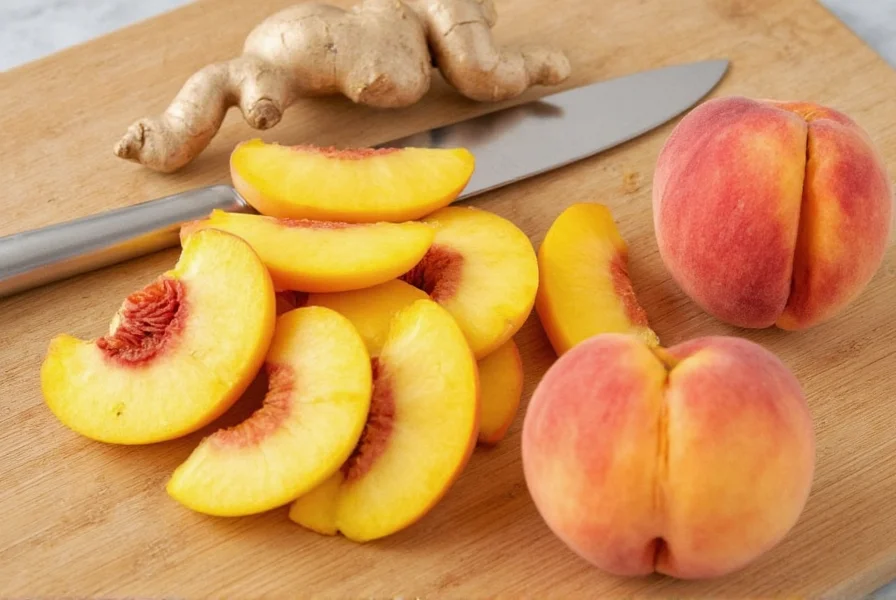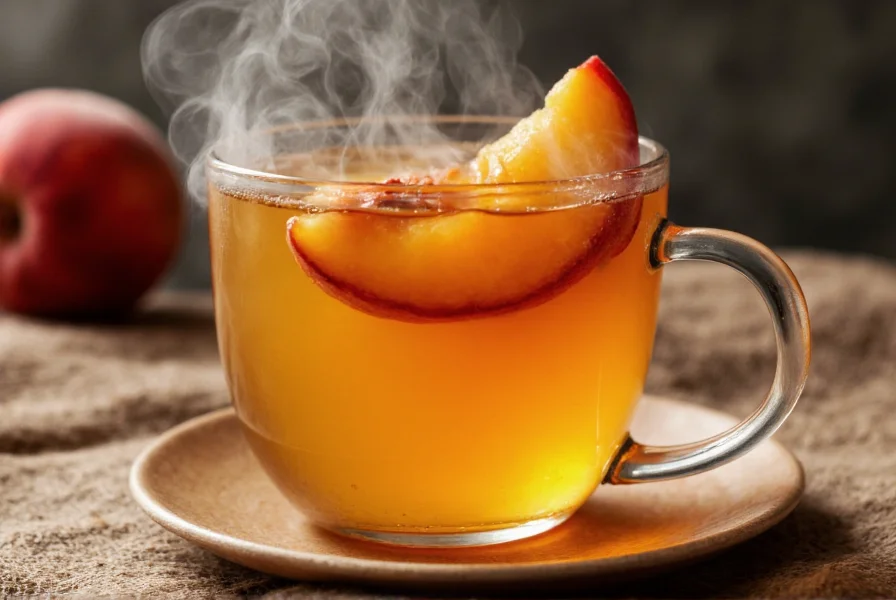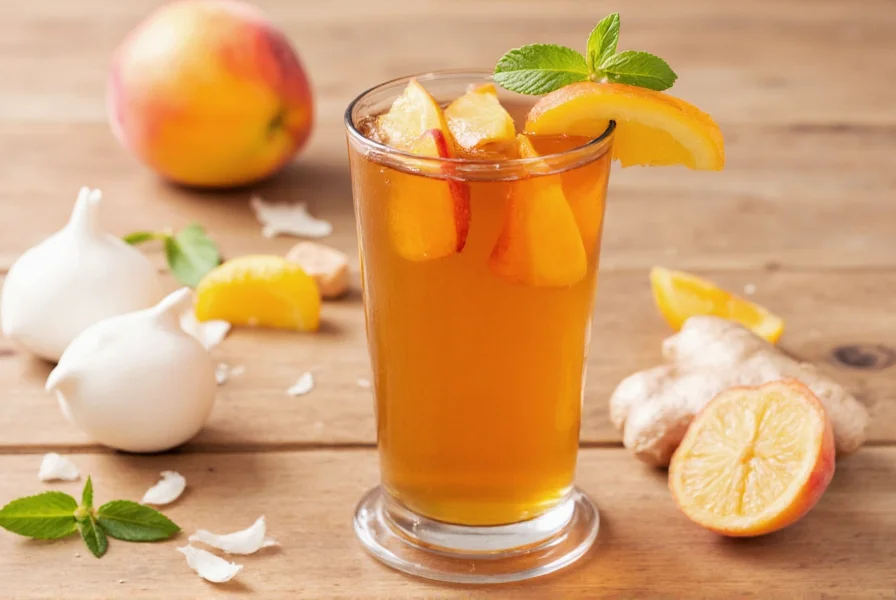
The Dynamic Duo: Peach and Ginger Explained
Peach and ginger tea represents a perfect marriage of flavor and function. Ginger, a rhizome with a 5,000-year history in traditional medicine, brings its characteristic spicy warmth and therapeutic compounds. Peaches contribute natural sweetness, vibrant color, and essential nutrients. Unlike many commercial tea blends that rely on artificial flavors, authentic peach ginger tea uses real fruit components or high-quality natural extracts.
Historically, ginger has been used across Asian and Middle Eastern cultures for digestive support and inflammation reduction. Peaches, native to China and later cultivated worldwide, have been valued for their hydrating properties and vitamin content. When combined in tea form, these ingredients create a beverage that's both pleasurable to drink and beneficial for health.
Science-Backed Health Benefits of Peach Ginger Tea
The health benefits of peach and ginger tea stem from the powerful compounds in both ingredients. Ginger contains gingerols and shogaols, which have demonstrated anti-inflammatory and antioxidant effects in numerous studies. Peaches provide vitamins A and C, potassium, and dietary fiber, particularly when using fresh ingredients in your peach ginger herbal tea preparation.
| Benefit | Primary Contributor | Scientific Support |
|---|---|---|
| Digestive Support | Ginger | Multiple studies show ginger accelerates gastric emptying and reduces nausea |
| Immune System Boost | Peach + Ginger | Vitamin C from peaches and ginger's antimicrobial properties work together |
| Anti-Inflammatory Effects | Ginger | Gingerols inhibit inflammatory pathways similar to NSAIDs but without side effects |
| Hydration and Electrolytes | Peach | High water content plus potassium supports fluid balance |
Research published in the Journal of Medicinal Food confirms that ginger consumption can significantly reduce markers of inflammation. Meanwhile, the carotenoids in peaches function as antioxidants that protect cells from damage. This makes peach ginger tea for digestion particularly effective after meals, as the ginger stimulates digestive enzymes while the peach provides gentle fiber.
Nutritional Profile of Homemade Peach Ginger Tea
A standard 8-ounce cup of properly brewed peach and ginger tea contains minimal calories—typically between 5-15 calories when made with fresh ingredients and no added sweeteners. This makes it an excellent choice for those monitoring their caloric intake while still enjoying flavorful beverages.
The nutritional value varies slightly depending on preparation method:
- Fresh ingredient method: Contains small amounts of vitamin C, potassium, and dietary fiber from the peach, plus ginger's bioactive compounds
- Tea bag method: Provides primarily the compounds extracted from ginger, with minimal fruit nutrients unless the blend includes real fruit pieces
- With honey addition: Increases caloric content (approximately 60 calories per tablespoon of honey) but adds antimicrobial properties
Compared to other popular herbal teas, peach ginger tea nutritional facts show it has higher potential antioxidant activity due to the combination of ingredients. It contains no caffeine, making it suitable for consumption throughout the day or before bedtime.

Perfect Peach Ginger Tea Recipe for Home Brewing
Creating authentic peach and ginger tea at home ensures maximum flavor and benefits. Here's a professional method for making fresh peach ginger tea that surpasses commercial blends:
Basic Fresh Peach Ginger Tea Recipe
- 2 cups filtered water
- 1 medium ripe peach, thinly sliced (skin on for extra nutrients)
- 1-inch piece of fresh ginger, thinly sliced or grated
- Optional: 1 teaspoon honey or maple syrup
- Optional: Squeeze of fresh lemon
- Bring water to just below boiling (195°F/90°C)
- Add peach slices and ginger to a heat-safe pitcher or teapot
- Pour hot water over ingredients
- Cover and steep for 10-15 minutes (longer for stronger ginger flavor)
- Strain into cups
- Add optional sweetener or lemon to taste
For iced peach ginger tea, double the ingredient concentration and pour over ice. This how to make peach ginger tea method preserves the delicate peach flavor while extracting ginger's beneficial compounds without making the tea bitter.
Optimal Timing for Drinking Peach Ginger Tea
Understanding when to drink peach ginger tea maximizes its benefits. Consider these timing recommendations based on your wellness goals:
- Before meals: 15-20 minutes prior to eating to stimulate digestive enzymes
- After meals: Especially helpful after rich or heavy meals to support digestion
- Morning: As a caffeine-free alternative to coffee for gentle wakefulness
- Evening: Its calming properties make it suitable before bedtime
- During cold season: Increased frequency may support immune function
For digestive concerns, many herbalists recommend drinking peach ginger tea for digestion approximately 20 minutes before meals. The gingerols activate digestive processes while the peach provides soothing properties. During colder months, this warming beverage serves as an excellent alternative to sugary drinks while providing immune support.
Considerations and Potential Side Effects
While peach and ginger tea side effects are minimal for most people, certain considerations apply:
- Ginger may interact with blood-thinning medications—consult your physician if taking anticoagulants
- Those with ginger allergies should avoid peach ginger herbal tea
- Excessive consumption (more than 4 cups daily) might cause heartburn in sensitive individuals
- Peach skin contains small amounts of natural compounds that could affect those with specific fruit allergies
The recommended daily amount of peach and ginger tea ranges from 1-3 cups for general wellness. Pregnant women should consult their healthcare provider about appropriate consumption levels, though moderate ginger intake is generally considered safe during pregnancy for nausea relief.
Frequently Asked Questions
Does peach and ginger tea contain caffeine?
No, authentic peach and ginger tea is naturally caffeine-free as it's an herbal infusion made from fruit and ginger root, not from the Camellia sinensis plant which contains caffeine.
How often can I safely drink peach ginger tea?
Most adults can safely enjoy 1-3 cups of peach ginger tea daily. Those using it for specific digestive concerns might benefit from drinking it before meals. As with any herbal preparation, moderation is key, and those with medical conditions should consult their healthcare provider.
Can I make peach ginger tea with dried ingredients?
Yes, you can make peach ginger tea with dried ingredients. Use 1-2 teaspoons of dried peach pieces and 1/4-1/2 teaspoon of dried ginger powder per cup of water. Dried ingredients typically require longer steeping times (15-20 minutes) to fully extract flavors and beneficial compounds compared to fresh ingredients.
Does peach ginger tea help with weight loss?
Peach ginger tea may support weight management efforts as a low-calorie beverage alternative to sugary drinks. The ginger content may slightly boost metabolism and promote feelings of fullness. However, it's not a standalone weight loss solution and works best as part of a balanced diet and active lifestyle.
What's the difference between peach ginger tea and store-bought peach tea?
Authentic peach ginger tea contains real ginger components that provide therapeutic benefits, while many commercial peach teas are simply flavored black or green teas without actual ginger. The ginger adds digestive benefits and a distinctive spicy note that plain peach tea lacks. Always check ingredients to ensure you're getting genuine peach and ginger tea benefits.











 浙公网安备
33010002000092号
浙公网安备
33010002000092号 浙B2-20120091-4
浙B2-20120091-4